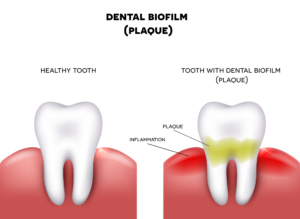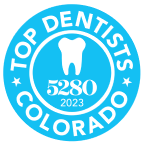
Dental plaque is a colorless, sticky film that forms on teeth when you eat and drink and each night while you sleep. It is the “fuzzy” feeling you notice on the surface of your teeth.
While fuzzy plaque may feel harmless, it is actually a community of bacteria that attracts even more bacteria and can lead to dental decay (cavities) and gum (periodontal) disease.
At Metropolitan Dental in Denver, CO, our gentle, caring dentists know what it takes to keep your mouth healthy. We perform a thorough examination and professional cleaning. In addition, we provide preventative education and discuss treatment options for any issues noted.
Why does dental plaque form?
Everyone has bacteria that normally live in the mouth. When we eat food, the bacteria feed on the sugars and carbohydrates left on our teeth. This interaction causes acids to form in the mouth. These acids can cause tooth decay by destroying tooth enamel.
In addition, plaque and tarter can cause gum (periodontal) disease, which can lead to further problems, including tooth loss and gum recession.
While most people have heard warnings about sugar causing cavities, there are many foods and drinks that cause plaque to form. Soft drinks, starches, fruits, and even milk contain carbohydrates that can lead to plaque.
Why does dental plaque matter?
When plaque remains on teeth, it can cause tooth decay. This can even occur below the gums, destroying the tissues that support your teeth.
Eventually, plaque accumulates minerals and hardens into tartar. This is the yellowish or off-white substance that accumulates on your teeth. While flossing and brushing easily remove plaque, tartar buildup requires professional cleaning.
Tartar buildup accumulates on your teeth and along your gumline, setting the stage for more plaque and bacterial accumulation. Tartar increases your risk of dental decay, which can lead to the need for fillings, root canals, or even extractions.
Plaque also gets under the gum line. As it builds up, it attracts more bacteria, which destroys gum tissue and causes separation of the gums from the teeth. This forms pockets, or spaces, between your teeth and gums.
These pockets attract more bacteria. As the bacteria, plaque, and tarter build up, more gum tissue is affected. The tartar irritates the gums, and the bacteria spread, increasing the pockets between teeth and gums. The eventual result is gum recession.
Left untreated, gum disease destroys bone tissue in the jaw. This causes deterioration of jawbone, which can lead to tooth loss.
How can I get rid of dental plaque?
Regular brushing for a minimum of two minutes is the best way to remove plaque. It is a great idea to brush after eating, especially if you eat foods high in sugars or carbohydrates.
Electric toothbrushes can be more effective than regular toothbrushes, as many dentists believe they are more effective at removing plaque.
When brushing, you will want to use a toothpaste that contains fluoride to help protect your teeth and keep them strong. Some studies suggest using a toothpaste that also contains baking soda removes plaque more effectively.
Since plaque also forms between teeth, daily flossing is important. Flossing also removes bacteria and food particles from between teeth.
Antibacterial mouthwashes provide a significant reduction in the bacteria that causes plaque and gum disease. These products should be used twice a day or after each meal.
Choosing the right foods helps reduce plaque. Avoid sugary snacks and, instead, opt for nutritious foods. Some foods, such as certain vegetables, even neutralize plaque-causing acids in your saliva and remove food particles from your teeth.
Routine dental visits are another vital step. At a minimum, you should see your dentist for examination and professional cleaning at least every six months.
What can my dentist do about dental plaque?
Professional cleanings remove plaque and tartar buildup. Your dentist will also perform a thorough oral exam to look for signs of decay and gum disease.
If you are prone to plaque and tartar buildup, ask your dentist about sealants. Dental sealants protect your teeth, especially the vulnerable grooves in the chewing surfaces of teeth. Sealants are painted on the surfaces of the teeth and protect your teeth from decay.
Fluoride treatments provided by your dentist can also benefit you. The percentage of fluoride is much higher and offers more protection for your teeth than what toothpaste provides.
Your dentist may also prescribe a mouth rinse. These are much stronger than over-the-counter mouthwashes and are quite effective at improving oral health and reducing plaque buildup.
Contact us Today to Schedule Your Appointment
How long has it been since you’ve been to the dentist? If you’re in the Denver area and needing a dentist, Metropolitan Dental has you covered. Our friendly, caring team of dental professionals can take care of all your dental needs. Call (303) 534-2626 today or contact us online to schedule an appointment.

